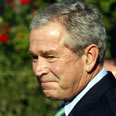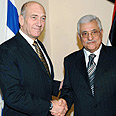

Trying to breathe new life into the Mideast peace process, President George W. Bush got an immediate reminder Monday of the difficulty of his task when Palestinian President Mahmoud Abbas insisted a US-
brokered conference should deal with ''issues of substance.''
Appearing before reporters with Abbas after an hour-long meeting that also included Palestinian Prime Minister Salam Fayyad, Bush did not mention the conference. He promised the United States ''will be a strong partner'' in establishing an independent state for Palestinians.
''I believe that the vision of two states side by side in peace is achievable,'' Bush said. ''We want to help you realize that goal.''
But Abbas said teams of Palestinians and Israelis will negotiate so that the issues are ''ready and right'' for the conference. He said the meeting should be the precursor to ''full negotiations on the permanent status.''
''We have faith and trust,'' Abbas said, emphasizing a hopeful tone about the process. ''We believe very strongly in your vision of establishing a Palestinian, independent, viable state.
"I also take this opportunity to reaffirm again that we strongly believe in the road map, which includes your vision, Mr. President, as well as the Arab initiative. Collectively, together, I believe they represent a strong framework that would allow us and help us to initiate the permanent status issues and reach an agreement on it," said Abbas.
Bush's Mideast focus came as he opened a three-day trip here for the annual UN General Assembly.
His talks with Abbas and Fayyad were aimed at preparing for his administration's Mideast meeting and bolstering two moderate leaders. That task is especially important to the US since the Palestinian territories split this summer into two camps ruled by rival governments -one controlled by Abbas in the West Bank and the other by Hamas in the Gaza Strip.
Bush praised Abbas for his performance in the face of daunting hurdles.
''I appreciate the fact that you're fighting the extremists who don't share the same kind of view,'' Bush said.
The president then received an update on the volatile region from his longtime ally Tony Blair, who after stepping down as British prime minister became the Mideast envoy for the Quartet - the United States, United Nations, European Union and Russia. Blair just completed his first extended visit to the region in his new role.
Five years ago, Bush became the first US president to fully and publicly call for a separate, independent Palestine alongside Israel. He has taken heavy criticism since, however, for his reluctance to ask hard compromises of close ally Israel and to put American capital on the line to get a deal.
But in July, the president announced he would organize an international conference on the Middle East, in possibly his administration's last chance to produce something on the decades-old conflict that has long
bedeviled American presidents.
Secretary of State Condoleezza Rice is shuttling back and forth between the US and the region to build momentum for the conference. In what she called a ''very difficult'' road ahead, the administration is hoping for a joint statement from Israeli and Palestinian leaders, as a first step toward more formal peace talks.















